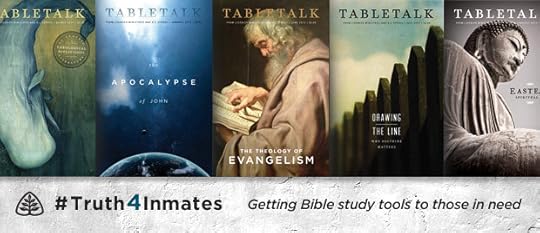R.C. Sproul's Blog, page 508
October 22, 2012
Pillars of Grace — 99¢ eBook Sale

For a limited time Reformation Trust is making select titles even more accessible as we lower their eBook price to 99¢. Today, until Reformation Day (October 31, 2012), we are offering you The Pillars of Grace by Dr. Steven Lawson.
The doctrines of grace are often known as the five points of Calvinism, but they were not the invention of John Calvin or his reforming cohorts of the sixteenth century. Rather, they are biblical doctrines, as Dr. Lawson demonstrated in his book Foundations of Grace (2006). Now, in Pillars of Grace, he shows that the doctrines of grace have been understood and taught—sometimes in embryonic form, sometimes with great clarity—throughout church history. From the time of the early church fathers to the years of the Reformers, there have been key men in the church, pillars as it were, who stood on the foundation of Scripture and upheld the truth of God's sovereign role in salvation.
"Reading Steven Lawson's Pillars of Grace is like taking a helicopter tour of a mountain range—a breathtaking survey of a series of majestic peaks all pointing upward to heaven. Each chapter offers an informative, fascinating, and accessible look at a significant teacher of God's glorious grace, from Clement to Calvin. Read this book and discover that to be Christian and Reformed is to be rooted in the church through the ages."
—Dr. Joel R. Beeke
President, Puritan Reformed Theological Seminary,
Grand Rapids, Michigan
"This book will ignite and impassion your heart for the gospel and the doctrines of grace that undergird it. Dr. Lawson has done something for which we will forever be grateful—he demonstrates conclusively that the truths of Calvinism and the Reformed faith are rooted in the history of the church, from the apostles to the emergence of Martin Luther in the sixteenth century... Do not start reading this book unless you are prepared to find that you are unable to put it down. It is that good."
—Dr. Derek W. H. Thomas
Professor of systematic and practical theology, Reformed Theological Seminary
Minister of teaching, First Presbyterian Church, Jackson, Mississippi
The Pillars of Grace is currently on sale for 99¢ as both an ePub from the Ligonier Store or from Amazon's Kindle Store. Offer expires on Reformation Day (October 31, 2012).

October 21, 2012
Twitter Highlights (10/21/12)
Here are highlights from our various Twitter accounts over the past week.
See everything in the light of who Jesus is, what He has done, and what He continues to do today. —Sinclair Ferguson
— Ligonier Ministries (@Ligonier) October 16, 2012
Contentedness and covetousness are directly opposite, as light and darkness (William Gouge).
— Ligonier Academy (@LigonierAcademy) October 17, 2012
Grateful to the Lord for Godly faculty who genuinely care about the spiritual growth of their younger brothers and sisters in Christ.
— RefBibleCollege (@RefBibleCollege) October 19, 2012
To me, Calvinism means the placing of the eternal God at the head of all things (Spurgeon).
— Tabletalk Magazine (@Tabletalk) October 19, 2012
If anything exposes our culture to the unmitigated wrath of God it is the frivolous way that we use His Name. —R.C. Sproul
— Ligonier Ministries (@Ligonier) October 20, 2012
$16 supplies an inmate w/ Bible study tools such as @tabletalk & other Reformed resources: ligm.in/Truth4Inmates2… #Truth4Inmates
— Ligonier Ministries (@Ligonier) October 20, 2012
God does not elect a person because he or she is godly, but in order that the person might become godly. —Steven Lawson bit.ly/fB8z7f
— Reformation Trust (@RefTrust) October 20, 2012
You can also find our various ministries on Facebook:
Ligonier Ministries | Ligonier Academy | Ligonier Connect | RefNet
Reformation Bible College | Reformation Trust | Tabletalk Magazine

October 20, 2012
How Can We Pray for You?
As always I give thanks for the prayers of God's saints on my family's behalf. One of the best lessons learned over months of mourning has been the experience of being held up by the prayers of the saints. We who are Reformed aren't always the most adept pray-ers. Being on the receiving end, however, makes me long to do better. Thank you for your prayers and every other offer of help. In the hopes of giving specific answers to this common and welcome question- how can we help- here are five peculiar challenges we are now facing.
1. Fear in my little ones.
The passing of both my wife and my little girl has brought forth fruitful conversations with all my children. The littler ones, however, are the most open and honest. They are at peace, but I am not surprised that they sometimes find themselves wondering, "Who is next?" My desire is that they would learn to believe and rest in the unchangeable verities, that they are loved on earth and in heaven, and that no circumstance could ever change that. My prayer is that they would rest on the Rock.
2. More pressure to deliver the goods.
I noted many months ago that many people seem to believe that there is a special kind of tree, heavy laden with juicy morsels of unusual wisdom, growing down in the valley of the shadow of death, and that we who walk there are supposed to bring out those nuggets on the other side. I have been delighted to share my journey over the months, and deeply grateful for the encouraging words I have received from so many. Now though is the burden of the looks of expectation I receive- what will he tell us now? Please pray that I would continue to be a help to others, but also that my foolish vanity would make me content to disappoint people waiting for amazing insights from me, that my vanity would be the next to die.
3. Competing demands for the ladies in my life.
Darby, Delaney, Erin Claire and Maili are doing well and continue to be a joy in my life. They are all blessing, and no burden. The weirdest thing I'm currently struggling with is I don't know which way to look. I was not done mourning my wife. And now time and energy and tears spilled over the loss of my daughter feel weirdly disloyal. Time and energy and tears spilled over my wife also feel weirdly disloyal. I know it makes no sense. I know they experience no jealousy. But there it is.
4. Jealousy of my wife.
Over the years as she grew bigger, even when my wife was well, Shannon became something of a special project for me. One key way I sought to help my wife in her domestic duties was to do the heavy lifting of the heavy lifting. I took Shannon up and down the stairs. I lifted her up into her bed. I fixed and fed her most of her meals. And now the two of them are talking, while I am left out. That sliver of me that is not an idiot rejoices for them both, and gives thanks to our Father in heaven. The rest of me wishes I could be there too.
5. That I would come to know who I am.
My identity is wrapped up in Christ. My self-image, right or wrong, however, has been wrapped up in being a husband and a father. What we do is make things better. As irrational as it may seem, it is difficult not to believe that I have failed my wife, failed my daughter, and in so doing, failed all of my children. I know that God numbered their days. I know also I wish there was something I could have done. Pray especially that I would not fail the seven children that are yet with us.
The pain cuts deeply. I pray it will change me deeply, that I am being remade into the image of that Man who is well acquainted with sorrow. My scars, I am confident, like His, will survive into the new creation, for they are not wood, hay and stubble, but precious jewels. Please pray with me that I won't waste my mourning.

October 19, 2012
John Calvin's 4 Rules of Prayer

For John Calvin, prayer cannot be accomplished without discipline. He writes, "Unless we fix certain hours in the day for prayer, it easily slips from our memory." He goes on to prescribe several rules to guide believers in offering effectual, fervent prayer.
1. The first rule is a heartfelt sense of reverence.
In prayer, we must be "disposed in mind and heart as befits those who enter conversation with God." Our prayers should arise from "the bottom of our heart." Calvin calls for a disciplined mind and heart, asserting that "the only persons who duly and properly gird themselves to pray are those who are so moved by God's majesty that, freed from earthly cares and affections, they come to it."
2. The second rule is a heartfelt sense of need and repentance.
We must "pray from a sincere sense of want and with penitence," maintaining "the disposition of a beggar." Calvin does not mean that believers should pray for every whim that arises in their hearts, but that they must pray penitently in accord with God's will, keeping His glory in focus, yearning for every request "with sincere affection of heart, and at the same time desiring to obtain it from him."
3. The third rule is a heartfelt sense of humility and trust in God.
True prayer requires that "we yield all confidence in ourselves and humbly plead for pardon," trusting in God's mercy alone for blessings both spiritual and temporal,56 always remembering that the smallest drop of faith is more powerful than unbelief. Any other approach to God will only promote pride, which will be lethal: "If we claim for ourselves anything, even the least bit," we will be in grave danger of destroying ourselves in God's presence.
4. The final rule is to have a heartfelt sense of confident hope.
The confidence that our prayers will be answered does not arise from ourselves, but through the Holy Spirit working in us. In believers' lives, faith and hope conquer fear so that we are able to "ask in faith, nothing wavering" (James 1:6, KJV). This means that true prayer is confident of success, owing to Christ and the covenant, "for the blood of our Lord Jesus Christ seals the pact which God has concluded with us." Believers thus approach God boldly and cheerfully because such "confidence is necessary in true invocation… which becomes the key that opens to us the gate of the kingdom of heaven."
Overwhelming? Unattainable?
These rules may seem overwhelming—even unattainable—in the face of a holy, omniscient God. Calvin acknowledges that our prayers are fraught with weakness and failure. "No one has ever carried this out with the uprightness that was due," he writes. But God tolerates "even our stammering and pardons our ignorance," allowing us to gain familiarity with Him in prayer, though it be in "a babbling manner." In short, we will never feel like worthy petitioners. Our checkered prayer life is often attacked by doubts, but such struggles show us our ongoing need for prayer itself as a "lifting up of the spirit" and continually drive us to Jesus Christ, who alone will "change the throne of dreadful glory into the throne of grace." Calvin concludes that "Christ is the only way, and the one access, by which it is granted us to come to God."
This excerpt is adapted from Joel Beeke's contribution in John Calvin: A Heart for Devotion, Doctrine, and Doxology .

October 18, 2012
Luther and the Psalms: His Solace and Strength

On 31 October 1517, Luther posted his historic Ninety-five Theses, launching his defiant protest against the vile perversions and grave abuses of the church in Rome. This decisive act became the hinge upon which history turned. And at the very core of this Protestant movement were the Psalms, which continued to play a defining role throughout Luther's life and ministry. While being hidden by supporters in Wartburg Castle, the German Reformer translated the Bible into the German language. Included in this work were the Psalms, which Luther referred to as 'the Bible in miniature'.
In future years, Luther would repeatedly turn to the Psalms for solace and strength. With the continent of Europe in upheaval, he found great comfort in the soul-lifting truths of the Psalms. Specifically, in 1527, Luther faced one of the greatest difficulties of his life as the Black Plague swept across Germany and much of the European continent. During this time, Luther's son almost died and his own body was fainting under the mounting pressure. In the midst of this personal conflict, Luther found himself contemplating the promises of Psalm 46, an encouraging psalm of trust in the invincibility of the Lord.
"...the Bible in miniature." —Martin Luther on the Psalms
Gaining new strength from this old song, Luther composed what is arguably his most famous hymn, 'A Mighty Fortress'. Amid such adversity, this embattled stalwart found God to be his 'bulwark never failing'. Though he had previously taught and even translated the Psalms, Luther now found himself living them as never before. Many times during this dark and tumultuous period, when terribly discouraged, he would turn to his co-worker, Philipp Melanchthon, and say, 'Come, Philipp, let us sing the forty-sixth Psalm.' Together, they would sing:
A sure stronghold our God is He,
A timely shield and weapon;
Our helper He will be and set us free
From every ill can happen.
With unshakable confidence in God, Luther reflected upon and drew strength from this choice psalm:
We sing this psalm to the praise of God, because He is with us and powerfully and miraculously preserves and defends His church and His word against all fanatical spirits, against the gates of hell, against the implacable hatred of the devil, and against all the assaults of the world, the flesh, and sin.
Despite Luther's intense inner turmoil, this valiant Reformer clung to the rock-solid truths of Israel's ancient hymn book. Four years before he died, he wrote in his Bible the text of Psalm 119:92: 'If Your Law had not been my delight, then I would have perished in my affliction.' Such biblical truth empowered this spiritual leader and enabled him to persevere in the midst of his many struggles to reform the church. To the very end, this daring leader of the Reformation tenaciously held to the glorious revelations of the Psalms.
This is an excerpt from Steven Lawson's Preaching the Psalms.
See also: Luther and the Psalms: His Thunder.
Copyright 2012 Steven J. Lawson. Preaching the Psalms published by EP Books.

$5 Friday: John Knox, The Holy Spirit, and God's Holiness

It's time for our weekly $5 Friday sale. This week's resources cover such topics as God's holiness, theology, John Knox, faith, the cross, eternal security, covenant theology, Jonah, and more. We thank P&R Publishing for their partnership this week.
Sale runs through 12:01 a.m. — 11:59 p.m. Friday EST.
View today's $5 Friday sale items.

The True Israel of God
Here's an excerpt from The True Israel of God, Burk Parsons' contribution to the October issue of Tabletalk.
"Father Abraham had many sons, many sons had father Abraham. I am one of them and so are you…," so the old children's song goes. Although it's a silly song that requires the raising of arms, legs, and the nodding of heads, the song's theology is unquestionably biblical. In Romans 4:1–16, the Apostle Paul explains that Abraham is "the father of us all."
As new covenant believers, we have been justified by grace alone through faith alone because of the finished work of Christ alone. As an old covenant believer, Abraham, the father of Israel, was justified by grace alone through faith alone because of the future work of Christ alone. Abraham stood on the promised salvation of God in the Messiah who was to come just as we stand on the promised salvation of God in the Messiah who has come. True believers in the Old Testament were saved in the same way that true believers are saved in the New Testament— by faith, and by faith alone. Abraham believed the Lord, and He counted it to him as righteousness (Gen. 15:6). The Lord declared Abraham righteous because he believed, just as the Lord declares us righteous because we believe. Thus, adoption into God's family and eternal covenant community is achieved not through having the right family name, ethnicity, land of birth, or residence. Neither are men and women the children of Abraham and, therefore, the children of Israel because of Sabbath-keeping or unconditional support of all of Israel's practices and policies. True Israel is faithful Israel, and only faithful Israel inherits God's promises. And faithful Israelites are those circumcised in their hearts, those who have trusted in the Messiah. This is the way God has always fulfilled His purposes in saving His people (Rom. 2:28–29).
Continue reading The True Israel of God.

October 17, 2012
An Unprecedented Offer: Get a 60-Part Overview of Systematic Theology

Something I have often heard in my long career as a theologian and teacher is "What really matters is what's in your heart." I've not just heard that from the world, I think I hear it from professing evangelicals more often than anyone else.

This phrase concerns me—not because it is wholly false. People who say it usually mean that God prizes deeply rooted conviction and affection within the person. And clearly this is a key biblical truth (1 Sam. 16:7; Luke 12:34; Rom. 2:29).
Yet Jesus tells us to love God with heart and mind (Matt. 22:37). We can't love anyone we don't know—even our great God. Burning hearts are not nourished by empty heads.
We can have heads full of knowledge that never penetrates our hearts, but our hearts can't fully adore the Lord unless we love Him with our minds. If we don't train our minds on His revelation, plumbing its depths to see how it fits together and informs all of life, our Christian growth will be stunted and sacrificial discipleship will be impossible.
We have been proclaiming this message through Ligonier for more than forty years through conferences, Reformation Bible College, Tabletalk, Reformation Trust, Renewing Your Mind radio broadcast, internet-based outreach, and teaching series. One key series is Foundations, which I designed specifically to help people learn the full scope of historic Christian teaching.
The sixty 23-minute lectures of Foundations cover every major Christian doctrine, including God's attributes, the person of Christ, the Trinity, mankind as God's image, sin, atonement, the Holy Spirit, Christ's return, and more. It lays the groundwork—a foundation—so that you can renew your mind to know and love better our holy Lord.
Burning hearts are not nourished by empty heads. —R.C. Sproul
This November, we want to air key parts of Foundations on Renewing Your Mind to help listeners worldwide understand the Christian faith. A gift of any amount will support the broadcast of these lectures and sustain our ministry at this critical time.
To thank you for your donation, we will send you the complete Foundations series on DVD and a CD with the series in MP3 format and a study guide. You will get all sixty lectures to use for your own learning, a group Bible study, or other purposes. We are making this unprecedented offer of one of our key teaching series because there is an urgent need today for Christians to be fully grounded in theology. You can donate via our secure website.
We must love God with heart and mind to experience the fullness of Christian discipleship. Your support will help us encourage the church in this truth and provide tools to help believers grow more deeply in Christ. Thank you.
Note: Offer expires 11/30/12. Please allow up to 6 weeks for delivery after your gift is processed. Contributions are tax-deductible as allowed by law. For federal income tax purposes, the deductible portion of your charitable contribution is limited to the excess of the money contributed over the value of the goods provided. Our good faith estimate of the value of this resource is $10. Offer valid in U.S. and Canada only. Thank you for your support.

Lady Jane Grey

We raise our children in a culture where many contemporary celebrities are famous simply for being famous. There are few celebrities to whom we can point our children as models of what we would like them to emulate. We may do a little better when we turn to history books. There we can show our children men and women of the past whose integrity caused them to stand firm for what was right even when it was costly to do so. But even in children's history textbooks, seldom do we find examples of men and women famous for holding fast to the gospel when they faced hardship and death for their faithfulness.
There is, of course, a great host of such godly men and women from throughout the centuries. It is a company added to daily as believers in the many countries that persecute Christians remain committed to their Savior in spite of threats and violence. Could it ever happen that our own children would find themselves face to face with such persecution?
To know the God of the Bible is to know that every detail of history is under his sovereign control. To know the history of the church (or current events) is to realize that our sovereign God often allows his people to suffer for him. It seems wise to raise our children in the awareness of what Christians in other places and in other times have endured in their commitment to the gospel. This would be one great reason to share Lady Jane Grey with your children. Simonetta Carr, its author, loves history, loves teaching, and loves children (no doubt, not necessarily in that order). This book is the latest in her series Christian Biographies for Young Readers. In the series, Carr is committed to presenting to our children people who are famous—at least in the church, and often beyond—for the most important thing: valuing Christ and the gospel above all else. The fact that Lady Jane was only sixteen when she was called, first, to rule, and then to die makes her life of that much more interest to those who are young themselves.
Another great reason to share this book with your children is that it is both carefully researched (see Carr's acknowledgments at the end of her book) and clearly, simply written in a style appropriate for elementary age children. Attractive artwork is found throughout. Sometimes the artwork comes in the form of a photograph of a famous portrait, place, or artifact. Other times the art is a full-page, color painting of the story's characters and events. This blend of well-told tale and frequent illustrations guarantees the engagement of young readers.
And that's not all. After six chapters of just the right length for school-aged children, we find a "Did You Know?" section with four pages of fascinating details from the time period that both children and adults will enjoy. A one-page time line to help keep straight what happened when in the life of Lady Jane Grey also appears at the end, along with the moving text of Jane Grey's letter to her sister just before she died.
For those who are not familiar with her name, Lady Jane is known as "the Nine-Day Queen." King Henry VIII of England had turned from Roman Catholicism to begin the Church of England. When he died, his son, King Edward VI, a Protestant, succeeded him to the throne. Later, when Edward himself was dying, he named his cousin, Jane Grey, also a Protestant, to take the throne after him. She was just sixteen. However, King Henry had previously named his daughter Mary, a Catholic and famous as "Bloody Mary" for her persecutions, to rule if Edward died. Mary's following was much stronger than Jane's, so Jane's rule lasted only nine days. She was imprisoned, tried for treason, and finally executed before her seventeenth birthday.
Carr doesn't leave us there, though. She briefly looks ahead to the time when a more biblical faith prevailed in England and then, further ahead, to our times and beyond, reminding her readers that God has always preserved both his Word and his church, and always will.
Starr Meade teaches history, art history, and literature to home school students and is the author of The Most Important Thing You'll Ever Study: a Survey of the Bible for young students.

Join the 2012 #Truth4Inmates Campaign

"As an inmate, I have been the beneficiary of a Tabletalk subscription graciously provided by friends of Ligonier. I really, really have profited from this great gift. I'm learning so much and am growing in grace – and I've been sharing the truth of God's Word with those around me." —Michael
Ligonier is committed to carrying out the Great Commission by obeying Christ's command to "go and make disciples of all nations…teaching them to obey everything I have commanded you" (Matthew 28:19,20). For two millenia these words have propelled Christians to carry the gospel to distant shores. This command should also prompt us to be active in our own cities and neighborhoods, sharing God's Word with unreached people in our midst who do not yet know Jesus.
One of the arenas in which the gospel most needs to be proclaimed is in our nation's jails, prisons, and correctional facilities. Every day we receive letters from Christian inmates who tell us of the unique spiritual challenges that confront believers behind bars. Non-Christian philosophies and worldviews occupy formidable footholds. False teaching is rampant. Biblically sound resources are scarce. Leaders often lack the training and materials that they need to reach their fellow prisoners.
At the same time, there is reason for hope. By His Spirit, God is awakening many prisoners to their need for Him. Lives are being changed by the gospel. There is a growing sense of spiritual hunger and a rising interest in the historic Christian faith. Many inmates attest that Jesus Christ has broken their spiritual chains and set them free. We are committed to aiding the spread of the gospel by making excellent biblical teaching available to inmates and prison chaplains. In the past, friends like you have supported this effort, enabling us to provide countless books, magazines, and other resources to inmates who could otherwise not afford them.
Our goal is to raise $4,000 to fund this effort by October 31, 2012. For a donation of $16, you are providing an inmate with much needed Bible study tools such as a subscription to Tabletalk magazine, a special-edition copy of The Reformation Study Bible, and other Reformed teaching resources.
"And you will know the truth, and the truth will set you free…So if the Son sets you free, you will be free indeed." (John 8:32,36)
It is our hope that God will use these resources not only to impact the heart and mind of the prisoner receiving the study materials, but also to have an effect on their fellow inmates and their families.
We believe that God is at work raising up His church behind the walls of our nation's correctional institutions. We invite you to take part in this ministry as we launch our 2012 #Truth4Inmates campaign. Will you join us?
Spread the Word
Please tell your family, friends, and church about this opportunity to serve inmates. Use the #Truth4Inmates hashtag in a tweet (or use the tweet button below) and click the "Recommend" and "+1" buttons at the bottom of this post.
You can also follow our updates @Ligonier and on Facebook.com/Ligonier.

R.C. Sproul's Blog
- R.C. Sproul's profile
- 1931 followers






